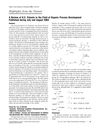
Search
for
Sort by
Research
510-540 / 1000+ results

research Development of a Liquid Chromatography/Mass Spectrometry-Based Inhibition Assay for Screening Steroid 5-Alpha Reductase in Human and Fish Cell Lines
A new method was created to test the effectiveness of Dihydrotestosterone (DHT) inhibitors, like finasteride and dutasteride, in human and fish cells. The results showed fish cells are more sensitive to these treatments, and dutasteride works better than finasteride in all tested cells.

research Current Status of the Applications of Conditioned Media Derived from Mesenchymal Stem Cells for Regenerative Medicine
Conditioned media from mesenchymal stem cells show promise for tissue repair and disease treatment, but more research is needed on their safety and effectiveness.

research 5α-Reductase Inhibitors: Evaluation of Their Potential Confounding Effect on GC-C-IRMS Doping Analysis
5α-reductase inhibitors can interfere with doping tests by masking banned substances.

research Repair of Damaged Hair Protein Fiber by Jointly Using Transglutaminase and Keratin
Using an enzyme and keratin treatment can significantly repair and strengthen damaged hair.

research Serum Zinc and Copper Levels in Alopecia
People with hair loss often have lower levels of zinc and copper in their blood.

research Impact of Acid Straightener's pH Value on Hair Fiber Properties
Lower pH straighteners change hair more but weaken it.

research Self-Assessments of Standardized Scalp Massages for Androgenic Alopecia: Survey Results
Scalp massages may help stabilize or regrow hair in people suffering from hair loss, regardless of age, gender, or use of other treatments.

research Culture of Pyramidal Neural Precursors, Neural Stem Cells, and Fibroblasts on Various Biomaterials
Different materials affect the growth of brain cells and fibroblasts, with matrigel being best for brain cell growth.

research Extractives of Cercidiphyllum Japonicum Twigs: Isolation and Structural Elucidation of a New Galloylflavonol Glycoside, Anomeric Tannins and Flavonoids
Scientists found a new natural compound and other known compounds in Cercidiphyllum japonicum twigs, which might be useful for medicine.

research Microbial Oxidation of Finasteride with Macrophomina Phaseolina (KUCC 730)

research Isolation and Characterization of Recombinant Murine Wnt3a
Scientists successfully purified a protein called Wnt3a, which is involved in processes like hair growth, but the overall yield was low, suggesting more work is needed to improve this.

research Reversible Myopathy and Ophthalmoparesis After Low-Dose Finasteride Administration for Androgenic Alopecia
Low-dose finasteride may cause muscle weakness and eye issues, but stopping the drug can lead to recovery.

research Simultaneous Estimation of Finasteride and Tamsulosin Hydrochloride in Combined Dosage Forms by RP-HPLC-PDA Method
The method accurately measures Tamsulosin and Finasteride in medication and is suitable for regular quality checks.

research 5α-Reductase Inhibitors: The Finasteride Story
Finasteride safely treats enlarged prostate and male-pattern baldness.

research Practical Management of Hidradenitis Suppurativa
Early diagnosis and treatment of Hidradenitis Suppurativa are important to prevent serious physical and mental effects.

research Cutaneous Distribution of Orally Administered Itraconazole in Guinea Pigs Studied by Autoradiography
Oral itraconazole effectively reaches and treats deep skin layers in guinea pigs.

research The Role of Dietary Supplements in Hair Loss Treatment: A Review of Evidence
Some supplements may help with hair loss, but there's not enough strong evidence to recommend them without doctor advice.

research Ascorbigen Induces Dermal Papilla Cell Proliferation In Vitro, But Fails To Modulate Chemotherapy-Induced Alopecia In Vivo
Ascorbigen increases hair cell growth in a lab setting but does not prevent hair loss from chemotherapy in mice.

research A Review of U.S. Patents in the Field of Organic Process Development Published During July and August 2004
The document reviews 20 U.S. patents from July and August 2004 about new drug forms, cancer treatments, aroma chemicals, statin drugs, and various chemical production methods.

research Morphological Characteristics and Notes of the Skin in Preclinical Toxicity Assessment
Skin structure complexity and variability are crucial for assessing skin toxicity in safety tests.

research An Adolescent Girl with Coexisting Ovarian Mature Cystic Teratoma and HAIR-AN Syndrome, an Extreme Subtype of Polycystic Ovarian Syndrome
A teenage girl had both a rare ovarian tumor and a severe form of polycystic ovarian syndrome.

research Hypoparathyroidism as the Single Major Component for Decades of Autoimmune Polyglandular Syndrome Type 1
A man with hypoparathyroidism had other health issues that led to a diagnosis of a rare autoimmune disorder, APS-1.

research Peculiar Hypertrichosis in a Patient Affected by Frontal Fibrosing Alopecia with Pseudo Fringe Sign
A woman with frontal fibrosing alopecia experienced unusual hair growth after using a specific topical lotion.

research Topical Valproate Solution for Hair Growth
Topical valproate can effectively promote hair growth.

research Does Myo-Inositol Oxygenase, the Only Enzyme to Catalyze Myo-Inositol In Vivo, Play a Role in the Etiology of Polycystic Ovarian Syndrome?
The enzyme myo-inositol oxygenase is not linked to the cause of polycystic ovarian syndrome.

research Iontophoresis on Minoxidil Sulphate-Loaded Chitosan Nanoparticles Accelerates Drug Release, Decreasing Their Targeting Effect to Hair Follicles
Using iontophoresis on minoxidil sulphate-loaded chitosan nanoparticles increases drug release but reduces its targeting to hair follicles.

research Adipose-Derived Stem/Stromal Cells in Regenerative Medicine
Fat tissue stem cells show promise for repairing different body tissues and are being tested in clinical trials.

research Simultaneous Quantitative Analysis of Tamsulosin and Finasteride in Pharmaceutical Dosage Form by U-HPLC Tandem Mass Spectrometry
Method measures tamsulosin and finasteride in medicine accurately.

research The Novel Excipient, Dodecyl-2-N, N-Dimethylaminopropionate Hydrochloride (DDAIP-HCl) Improves the Flux of Minoxidil in Human Skin
DDAIP-HCl significantly increases minoxidil absorption into the skin.